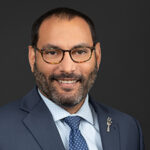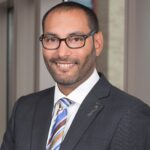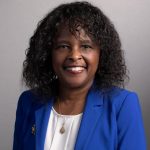With a long interest in the value of volunteering and advocating for rheumatology, William “Will” F. Harvey, MD, MSc, FACR, associate professor of medicine, Tufts University School of Medicine, Boston, has now taken on a new role as ACR secretary. Here, Dr. Harvey talks about dealing with the variety of challenges facing the profession, his goals for the ACR in the coming year and beyond, and the importance of community to keep the profession going strong.
The Rheumatologist (TR): To start, the ACR secretary is a new volunteer position in that it was previously part of a joint secretary/treasurer post. Is that right?

Dr. Harvey
Dr. Harvey: Yes and no. The two posts had been separate until several years ago, when the ACR went through a governance reorganization [and combined them], but leadership has since found that merging the positions wasn’t helpful with regard to the amount of work necessary to get both jobs done. Now, the secretary and treasurer are separate again and have staggered two-year roles, so the holder of each serves a two-year term, then becomes president elect for a year and finally ACR president. Because I am starting partway into the term, I will be secretary for 18 months before becoming president-elect of the ACR.
TR: What initiatives do you hope to continue or begin as ACR secretary?
Dr. Harvey: One of the roles of the ACR secretary relates to corporate relations, most of which involves interactions with pharmaceutical companies. As the economic environment continues to change, it will be important that we balance partnering with the industry to take better care of our patients and ensure the survival of our specialty while making sure the ACR, as the most respected authority in the specialty, maintains its independence and its voice.
Another focus is around member engagement. One of the aims of our current strategic plan is to increase engagement and collaboration across the global rheumatology community, with the hope of giving a voice to underrepresented groups as well as providing new opportunities for our diverse membership. It’s going to be very important for us to work on member engagement and counter the membership decline by reimagining and growing some of our activities, notably the annual meeting, ACR Convergence.
TR: You have held several volunteer posts with the ACR. What drove you to begin volunteering for the College?
Dr. Harvey: The main reason I wanted to volunteer was just to get a better sense of community with my peers across the country. There aren’t all that many of us in this field, so when you’re in your own little world, whether a department or practice, it’s hard to feel connected to other people.
And the second main reason is that for a long time—since high school really—one of my hobbies has been doing advocacy work, and government advocacy specifically. Once I began to learn about everything the ACR was doing in the space of healthcare reform and healthcare advocacy, I suddenly realized for the first time that I could combine my love of the specialty with my desire to continue to do government relations work.
TR: What other volunteer ACR positions have you held?
Dr. Harvey: My first volunteer position was as a fellow-in-training member on the Government Affairs Committee (GAC). Then the ACR Board of Directors had started a position called Young Board Member, which is open to those under the age of 40, so I served in that capacity. After that, I went on to chair the GAC for three years. Then I went back to serve on the Board of Directors, and most recently, I have spent about two and a half years as chair of the Registries & Health Information Technology (RHIT) committee.
TR: The RHIT has been concentrating on the Rheumatology Informatics System for Effectiveness (RISE). Can you describe that work?
Dr. Harvey: RISE is the largest registry of real-world data in rheumatology in the U.S, collecting data from participating practices all across the country. It allows that data to be used not only by researchers, but also by practices so they can successfully compete in the Medicare Quality Payment Programs. One of the reasons it has been so meaningful for practices is that it has helped ensure that Medicare’s quality measures are meaningful and consonant with the work that we do every day, rather than more generic measures that apply to almost any physician but not rheumatologists specifically.
In addition, the RHIT is also hoping to grow an initiative called the Learning Collaborative, which is a way of bringing together RISE data users together so they can share with and learn from each other to ultimately improve the work rheumatologists do and the care of our patients.
TR: What other achievements from your previous roles with the ACR would you like to highlight?
Dr. Harvey: Starting with my work on the GAC, through my time on the Board of Directors and the quality-measure work in the registry that I just mentioned, the ACR has done an amazing job maturing its ability to advocate for and protect the vibrancy of rheumatologic practice. Besides building more useful quality measures, we’ve been able to influence the way that the Merit-Based Incentive Payment System (MIPS) and Medicare Access & CHIP Reauthorization Act (MACRA) programs have been shaped as they relate to rheumatology. That has helped rheumatologists sustain their practices more effectively.
TR: What would you like to share about yourself to help members get to know you a bit better?
Dr. Harvey: There are a couple things I can share. One is that community is important to me, partly because I’m from a pretty small town—born and raised in Hershey, Pa.—and small towns thrive on a sense of community. Even being located in a bigger city like Boston now, I still find that community is important.
The second thing I’ll mention also has to do with community. My father immigrated to this country, and I’m the product of an interracial marriage. That has had some interesting impacts on me; I have a strong sense that our community doesn’t stop at our country borders; it stretches to rheumatologists and other related professionals who are working all over the world on the same challenges we are. I see the value of that feeling of belonging from my own personal experience, and I believe it is important to help all of our members feel supported by one another. These are some of the reasons why I work so hard to instill a sense of community in the ACR.
Leslie Mertz, PhD, is a freelance science journalist based in northern Michigan.


